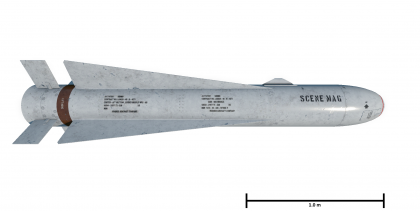AGM-65B
Contents
Description
Write an introduction to the article in 2-3 small paragraphs. Briefly tell us about the history of the development and combat using the weaponry and also about its features. Compile a list of air, ground, or naval vehicles that feature this weapon system in the game.
Vehicles equipped with this weapon
General info
Tell us about the tactical and technical characteristics of the missile.
Effective damage
Describe the type of damage produced by this type of missile (high explosive, splash damage, etc)
Comparison with analogues
Give a comparative description of missiles that have firepower equal to this weapon.
Usage in battles
Describe situations when you would utilise this missile in-game (vehicle, pillbox, base, etc)
Pros and cons
Pros:
- Fire-and-Forget missile
- Far standoff range (6 km)
- Ease of use
Cons:
- The AGM-65B is comparatively weak when compared with other air-to-ground missiles: it requires a direct hit to kill ground vehicles, occasionally being absorbed by ERA even on directs hits.
History
he Maverick's development history began in 1965, when the United States Air Force (USAF) began a program to develop a replacement to the AGM-12 Bullpup. With a range of 16.3 km (8.8 nmi), the radio-guided Bullpup was introduced in 1959 and was considered a "silver bullet" by operators. However, the launch aircraft was required to fly straight towards the target during the missile's flight instead of performing evasive maneuvers, thus risking the crew. Even when it hit, the small 250 pounds (110 kg) warhead was only useful against small targets like bunkers, when used against larger targets like the Thanh Hóa Bridge it did little other than char the structure. The USAF began a series of projects to replace Bullpup, both larger versions of Bullpup, models C and D, as well as a series of Bullpup adaptations offering fire-and-forget guidance. Among the latter were the AGM-83 Bulldog, AGM-79 Blue Eye and AGM-80 Viper.
From 1966 to 1968, Hughes Missile Systems Division and Rockwell competed for the contract to build an entirely new fire-and-forget missile with far greater range performance than any of the Bullpup versions. Each were allocated $3 million for preliminary design and engineering work of the Maverick in 1966. In 1968, Hughes emerged with the $95 million contract for further development and testing of the missile; at the same time, contract options called for 17,000 missiles to be procured. Hughes conducted a smooth development of the AGM-65 Maverick, with the first unguided test launch from an F-4 on 18 September 1969, with the first guided test on 18 December successfully performing a direct hit on a M41 tank target at the Air Force Missile Development Center at Holloman Air Force Base, New Mexico.
In July 1971, the USAF and Hughes signed a $69.9 million contract for 2,000 missiles, the first of which was delivered in 1972. Although early operational results were favorable, military planners predicted that the Maverick would fare less successfully in the hazy conditions of Central Europe, where it would have been used against Warsaw Pact forces. As such, development of the AGM-65B "Scene Magnified" version began in 1975 before it was delivered during the late 1970s. When production of the AGM-65A/B was ended in 1978, more than 35,000 missiles had been built.. https://en.wikipedia.org/wiki/AGM-65_Maverick
Media
See also
- https://web.archive.org/web/20130801115632/http://www.af.mil/information/factsheets/factsheet.asp?id=72references to approximate analogues by other nations and research trees.
External links
Paste links to sources and external resources, such as:
- topic on the official game forum;
- other literature.




